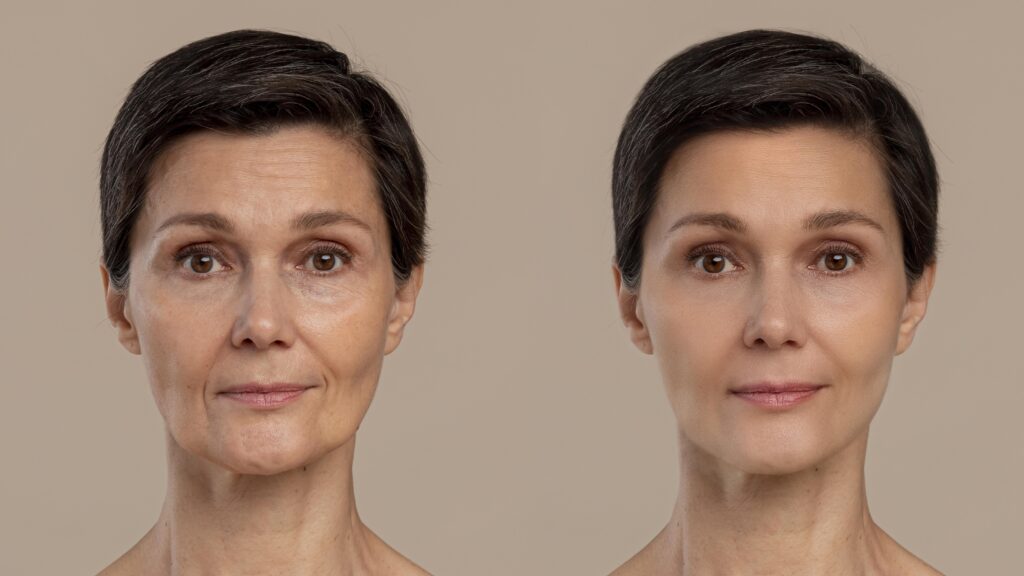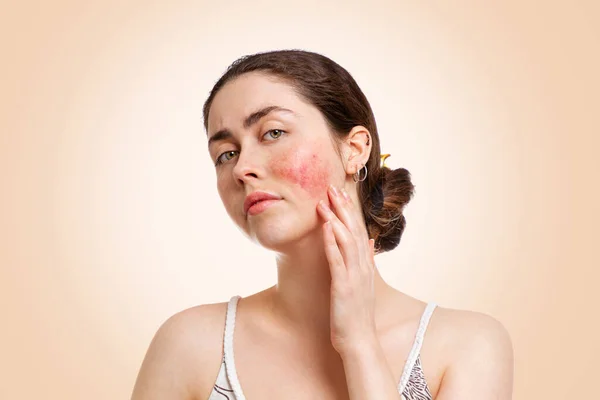
Does your face sometimes feel flushed and look red, especially around your nose and cheeks? Do you experience tiny bumps or visible blood vessels on your skin? If so, you might be dealing with rosacea, a common skin condition that affects millions of people worldwide.
While there’s no cure for rosacea, there are many effective ways to manage it and keep it under control. This article will equip you with 7 powerful tips for rosacea treatment, helping you achieve calmer, clearer skin and regain your confidence.
Understanding Rosacea: What is it and Why Does it Happen?
Rosacea can be a bit of a mystery. Doctors aren’t entirely sure what causes it, but they believe it’s a combination of factors. Here’s what we know:
- Genetics: Rosacea can run in families, so if you have a close relative with it, you might be more prone to developing it.
- Fair Skin: People with fair skin are more likely to experience rosacea.
- Triggers: Certain things can trigger rosacea flare-ups, making your symptoms worse. These include sun exposure, spicy foods, hot drinks, alcohol, stress, and certain skincare products.
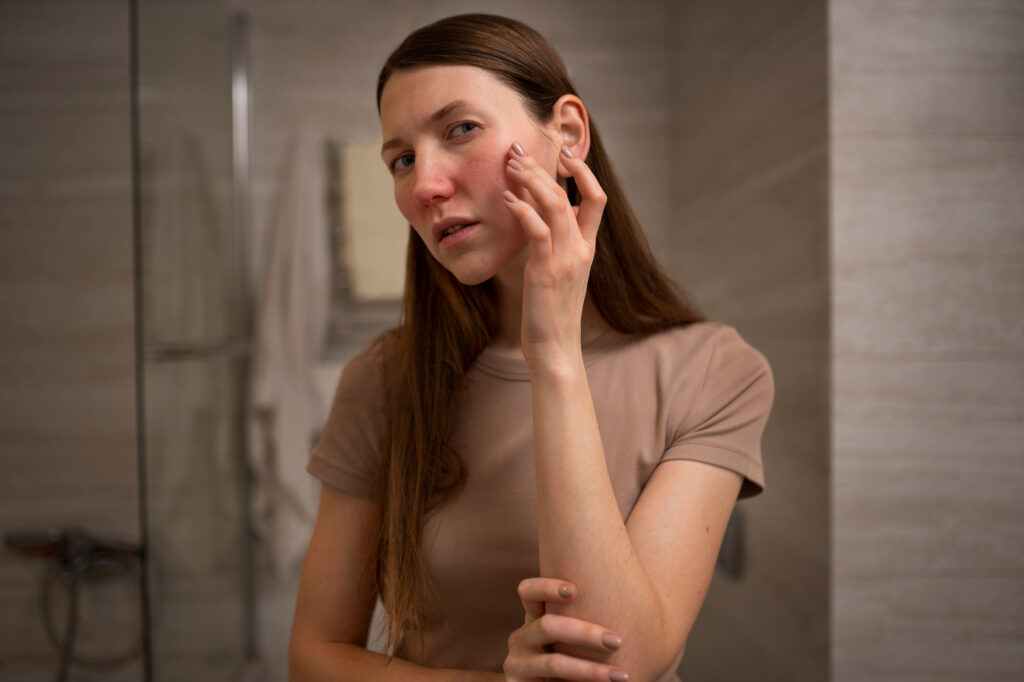
Rosacea Symptoms: Recognizing the Signs
Rosacea can manifest in different ways, but some common symptoms include:
- Facial redness: This is often the most noticeable symptom, with redness and flushing appearing on the cheeks, nose, chin, and forehead.
- Visible blood vessels: Tiny red blood vessels might become visible on the surface of the skin.
- Bumps and pimples: Small, red bumps or pustules may appear on the affected areas.
- Burning or stinging sensation: The affected skin might feel hot, burning, or stinging.
- Dry, flaky patches: Some people with rosacea experience dry, scaly patches on their skin.
- Eye problems: In some cases, rosacea can affect the eyes, causing redness, dryness, irritation, or a burning sensation.
Also Read: Does Microdermabrasion Work For Stretch Marks? A Comprehensive Guide
7 Tips for Rosacea Treatment: Take Control of Your Skin
Now that you understand the basics of rosacea, let’s dive into actionable tips to manage it effectively:
Identify Your Triggers and Avoid Them:
Pinpointing your triggers is crucial for preventing flare-ups. Here are some common triggers to watch out for:
- Sun exposure: This is a major trigger for many people with rosacea. Make sun protection a priority! Use a broad-spectrum sunscreen with SPF 30 or higher every single day, even on cloudy days. Consider wearing hats with wide brims for added protection.
- Spicy foods: Spicy foods can cause flushing and irritation. Pay attention to how your skin reacts to different spices and adjust your diet accordingly.
- Hot drinks: Beverages like coffee, tea, and hot cocoa can sometimes trigger rosacea. Try drinking them lukewarm or consider switching to herbal teas that are known to be soothing.
- Alcohol: Alcohol can dilate blood vessels, leading to redness. If you choose to drink alcohol, do so in moderation and be mindful of how your skin reacts.
- Stress: Stress can worsen rosacea symptoms. Find healthy ways to manage stress, such as yoga, meditation, or spending time in nature.
- Skincare products: Certain skincare ingredients can irritate rosacea-prone skin. Look for fragrance-free, gentle products labeled “non-comedogenic” (meaning they won’t clog pores).
Gentle Skincare Routine is Key:
Harsh scrubbing and abrasive products can aggravate rosacea. Here’s what your gentle skincare routine might look like:
- Cleanse twice daily: Use a gentle, fragrance-free cleanser specifically formulated for sensitive skin. Wash your face with lukewarm water and pat it dry with a soft towel instead of rubbing.
- Moisturize regularly: Rosacea can make your skin dry, so moisturizing is essential. Look for lightweight, oil-free moisturizers that won’t clog your pores.
- Skip the harsh scrubs: Exfoliating scrubs can irritate rosacea. Opt for a gentle chemical exfoliant with AHAs (alpha hydroxy acids) like lactic acid or glycolic acid, but consult your doctor first.
Also Read: What is Skin Fasting and How Does It Work? | Transform Your Skincare Routine!
Sunscreen is Your Best Friend:
Sun exposure is a major trigger for rosacea flare-ups. Here’s how to make sun protection a habit:
- Choose a broad-spectrum sunscreen: This protects your skin from both UVA and UVB rays.
- SPF 30 or higher is a must: Don’t settle for anything less! Reapply sunscreen every two hours, or more often if you’re sweating or swimming.
- Consider physical sunblock: Mineral sunscreens containing zinc oxide or titanium dioxide can be a good option for rosacea-prone skin, as they sit on top of the skin and physically block UV rays, minimizing irritation.
Seek Medical Advice for Treatment Options:
While you can manage rosacea with lifestyle changes and a gentle skincare routine, a dermatologist can offer additional treatment options:
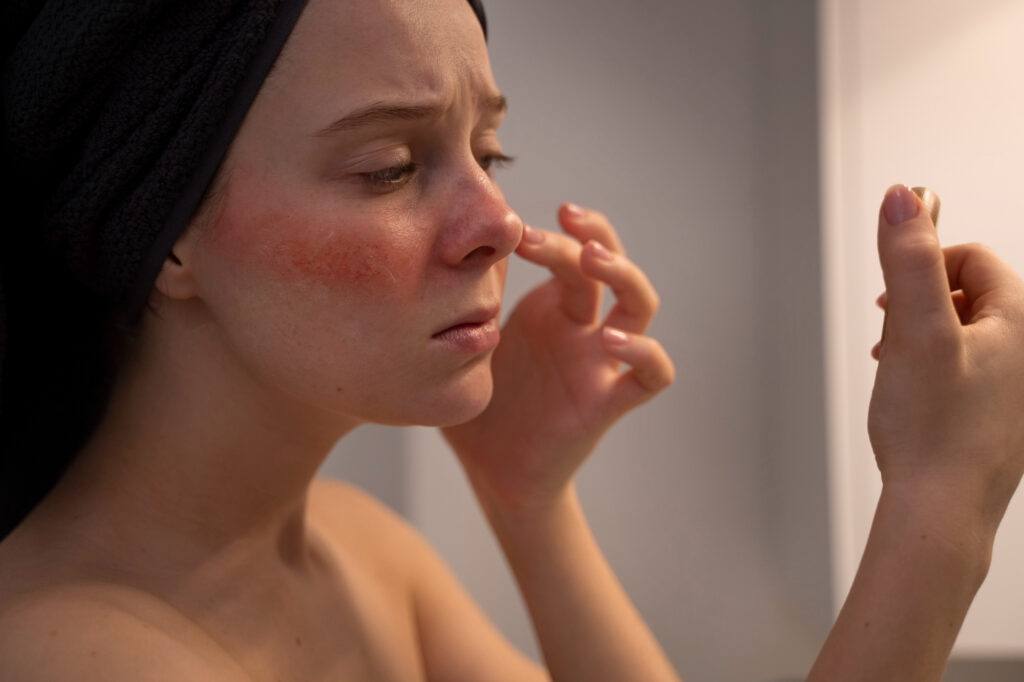
- Topical medications: These creams or gels applied directly to the skin can help reduce redness, inflammation, and bumps. Common options include metronidazole, azelaic acid, and ivermectin.
- Oral medications: In some cases, your doctor might prescribe oral antibiotics to reduce inflammation.
- Laser treatment: Laser therapy can target visible blood vessels and improve the overall appearance of the skin.
Consider Natural Remedies For Rosacea (with Caution):
While there’s no scientific cure for rosacea, some natural remedies might offer soothing relief. However, it’s important to be cautious and consult your doctor before trying anything new:
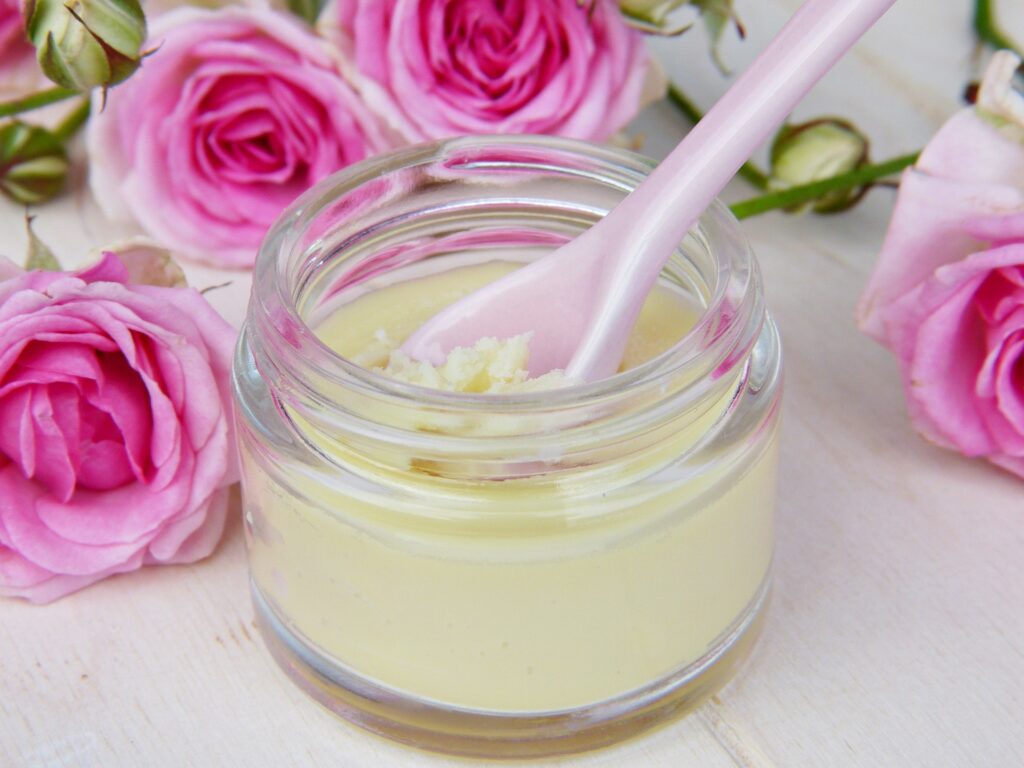
- Aloe vera: This natural ingredient has anti-inflammatory properties and can be calming for irritated skin. Look for aloe vera gel that is free of added fragrances or alcohol.
- Oatmeal baths: Oatmeal has soothing properties and can help relieve itching and burning. Grind oatmeal into a fine powder and add it to your lukewarm bathwater. Soak for 15-20 minutes, then pat your skin dry.
- Tea tree oil: Tea tree oil has antibacterial properties, but it can be irritating. Dilute it with a carrier oil like jojoba oil before applying a small amount to a test area. If you experience any irritation, discontinue use.
Also Read: The Ultimate Guide To The Best Skincare Routine For Dry Skin With Hyperpigmentation
Makeup Can Be Your Friend (Choose Wisely):
Rosacea doesn’t have to stop you from wearing makeup. Here are some tips for makeup that won’t irritate your skin:
- Look for mineral makeup: Mineral makeup is generally gentler on sensitive skin.
- Patch test before you apply: Apply a small amount of makeup to your inner elbow and wait 24 hours to see if you experience any irritation.
- Use a green color corrector: This can help neutralize redness before applying foundation.
- Opt for lightweight formulas: Avoid heavy makeup products that can clog pores and worsen symptoms.
- Gently cleanse your face at night: Always remove all makeup before going to bed to prevent clogged pores and irritation.
Be Patient and Consistent:
Rosacea management is a marathon, not a sprint. It takes time to find what works best for you. Be patient with your skin and consistent with your routine. Here are some additional tips for staying motivated:
- Keep a journal: Track your triggers, skincare routine, and how your skin reacts. This can help you identify patterns and adjust your approach as needed.
- Join a support group: Connecting with others who understand what you’re going through can be incredibly helpful. Online forums and social media groups can be a great source of support and information.
- Focus on the positive: Celebrate your successes, no matter how small. Even a slight reduction in redness can be a victory!
Remember: Rosacea is a common condition, and you’re not alone. With the right approach, you can manage your rosacea and achieve healthy, calmer skin.
Final Thoughts: Rosacea Doesn’t Have to Define You
Rosacea can be frustrating, but it’s important to remember that you’re not alone. Millions of people around the world manage this condition, and with the right approach, you can too.
By following the tips outlined in this article, you can effectively manage your rosacea and achieve calmer, clearer skin. Remember, be patient, consistent, and celebrate your victories, no matter how small. There will be good days and bad days, but don’t let rosacea control your life.
Taking care of your skin, managing triggers, and seeking professional help when needed will empower you to take charge of your rosacea and regain your confidence. With a little effort and a positive attitude, you can achieve healthy, beautiful skin that radiates from within.
Additional Resources:
- The American Academy of Dermatology: Rosacea: Diagnosis and Treatment
- The National Rosacea Foundation: Rosacea Information
Rosacea Treatment: Bonus Section – FAQs
Here are some commonly asked questions from people with rosacea:
- Can I drink alcohol if I have rosacea?
Alcohol consumption can be a trigger for rosacea flare-ups in some people. It’s best to observe how your skin reacts and limit alcohol intake if it worsens your symptoms.
- What foods should I avoid if I have rosacea?
There’s no one-size-fits-all answer, but common trigger foods include spicy foods, hot drinks, and processed foods. Pay attention to how your skin reacts to different foods and adjust your diet accordingly. Keeping a food journal can be helpful in identifying your triggers.
- I have rosacea. Can I wear makeup?
Absolutely! Choose mineral makeup that is fragrance-free and non-comedogenic (won’t clog pores). Patch test any new makeup product before applying it to your entire face.
- Does rosacea go away?
Unfortunately, there’s no cure for rosacea. However, with proper management and treatment, you can effectively control your symptoms and achieve clearer, calmer skin.
- Will rosacea scar my face?
Rosacea itself doesn’t typically cause permanent scarring. However, if you experience severe papules or pustules (pimples) and don’t treat them properly, they might leave scars. Early treatment and good skincare practices can help prevent scarring.
- I’m stressed, and it seems to worsen my rosacea. What can I do?
Stress can definitely be a trigger for rosacea flare-ups. Finding healthy ways to manage stress is crucial. Consider activities like yoga, meditation, deep breathing exercises, or spending time in nature.
- Can rosacea affect my eyes?
In some cases, rosacea can affect the eyes, causing a condition called ocular rosacea. Symptoms might include redness, dryness, irritation, or a burning sensation in the eyes. If you experience any eye problems alongside your rosacea, consult your doctor for proper diagnosis and treatment.
- What if my rosacea isn’t responding to over-the-counter treatments?
If over-the-counter medications aren’t helping, it’s time to see a dermatologist. They can assess your individual case and recommend prescription-strength medications or other treatment options like laser therapy.
Remember, consulting a dermatologist is always recommended, especially if you have any concerns about your rosacea or if over-the-counter treatments aren’t providing relief. With the right approach and a little patience, you can manage your rosacea and achieve beautiful, healthy skin.
